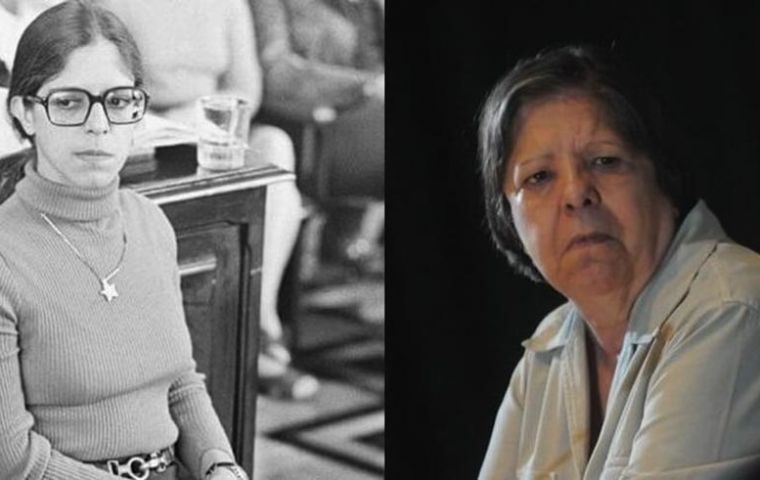MercoPress. South Atlantic News Agency
Testimony of torture centre survivor in Brazil could help crush 1979 amnesty law shielding military officials
 A court has ruled that the military officer should stand trial for the alleged rape of Inês Etienne Romeu, who managed to survive at the clandestine torture centre
A court has ruled that the military officer should stand trial for the alleged rape of Inês Etienne Romeu, who managed to survive at the clandestine torture centre  Some 400 people were killed or disappeared under Brazil's military rule; Ms Romeu's detailed account of her captivity at the “House of Death” were crucial
Some 400 people were killed or disappeared under Brazil's military rule; Ms Romeu's detailed account of her captivity at the “House of Death” were crucial  The ruling comes at a time when far-right President Jair Bolsonaro has expressed nostalgia for the time when Brazil was under military rule.
The ruling comes at a time when far-right President Jair Bolsonaro has expressed nostalgia for the time when Brazil was under military rule. Details provided by the sole survivor of a torture centre in Brazil could lead to the imprisonment of a man accused of raping her during her captivity. The accused has so far been shielded by a 1979 amnesty law which prevents military officials from being prosecuted for crimes committed under military rule.
But now a court has ruled that he should stand trial for the alleged rape of Inês Etienne Romeu, who managed to survive her time at the clandestine torture centre by pretending she had been “turned” by her captors.
More than 400 people were killed or disappeared during Brazil's military rule and Ms Romeu's detailed account of her months in captivity at the clandestine prison dubbed “House of Death” were key in bringing information about the military's excesses to light.
The ruling comes at a time when far-right President Jair Bolsonaro has expressed nostalgia for the time when Brazil was under military rule.
Prosecutors in the state of Rio have been investigating a former army sergeant, Antônio Waneir Pinheiro de Lima, over crimes he is alleged to have committed at a torture centre in the 1970s, when Brazil was under military rule.
They tried to open a criminal case against Sgt Lima but a judge in Rio state argued that Mr Lima was protected by an amnesty law. The law, which was passed by the military regime in 1979 and upheld by Brazil's Supreme Court in 2010, shields those who committed “political crimes” between September 1961 and August 1979 from prosecution.
The prosecutors appealed against the judge's decision at a federal tribunal. On Wednesday, the judges on the federal tribunal voted two against one to open a criminal case against Sgt Lima.
The judges accepted the argument made by the prosecutors that the crimes Mr Lima is accused of, including rape and kidnapping, constitute crimes against humanity and as such cannot be covered by the 1979 amnesty law.
They ordered that Sgt Lima face a criminal trial. However, this decision could be overturned by the Supreme Court.
Sgt Lima is suspected of kidnapping, torturing and raping a left-wing activist at a torture centre in the Brazilian city of Petrópolis, north of Rio de Janeiro. The woman, Inês Etienne Romeu, was the only person to leave the centre, dubbed House of Death, alive.
The building was a clandestine jail used to hide and torture left-wing activists. At least 22 political prisoners are thought to have been killed there. Ms Romeu, who was arrested on suspicion of taking part in the kidnapping of the Swiss ambassador Giovanni Enrico Bucher, was held there between May and September 1971.
She said that during her captivity she was subjected to physical and psychological torture so severe that she tried to kill herself on three occasions. She also said that she was raped twice by Sgt Lima who was one of the jailers at the “House of Death”.
Sgt Lima has said that he was a “watchman” at the centre but has denied having any knowledge of what went on inside the house. He was arrested in 2014 as part of an investigation into military-rule era crimes.
Ms Romeu managed to get out of the clandestine centre alive by pretending to have been “turned” by her captors, agreeing to their demand that she spy on her fellow left-wing activists.
Her jailors told her that if she did not provide them with the information they wanted, they would arrest her sister. When she was released and taken to her sister's home, Ms Romeu only weighed 32kg and was severely ill.
Her family took her to hospital, knowing that she would be arrested and formally charged but rightly assumed that she would be safer in a state prison than if her military captors took her back to a clandestine torture centre.
She was released in 1979 under the same amnesty law which has been shielding Sgt Lima. Upon her release, she gave invaluable information about the House of Death and those who worked there.
It was thanks to the details she had memorized that the clandestine torture centre was located and that a doctor who collaborated with the torturers was identified.
In 2003, Ms Romeu was attacked by a man she had hired to do some carpentry work in her home. Her family suspected that the man, who severely beat her over the head, was only posing as a carpenter and had been hired to silence Ms Romeu by people who did not want her to reveal more information about the House of Death.
While Ms Romeu survived the attack she suffered neurological problems until she died in her sleep in 2015 aged 72.




Top Comments
Disclaimer & comment rulesCommenting for this story is now closed.
If you have a Facebook account, become a fan and comment on our Facebook Page!